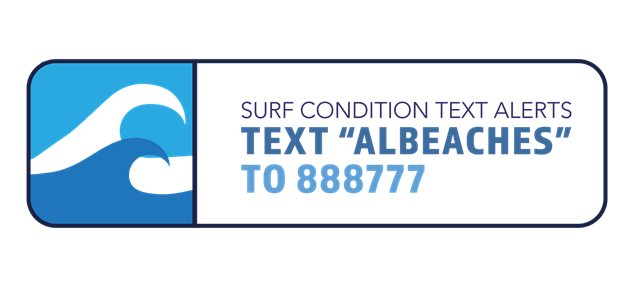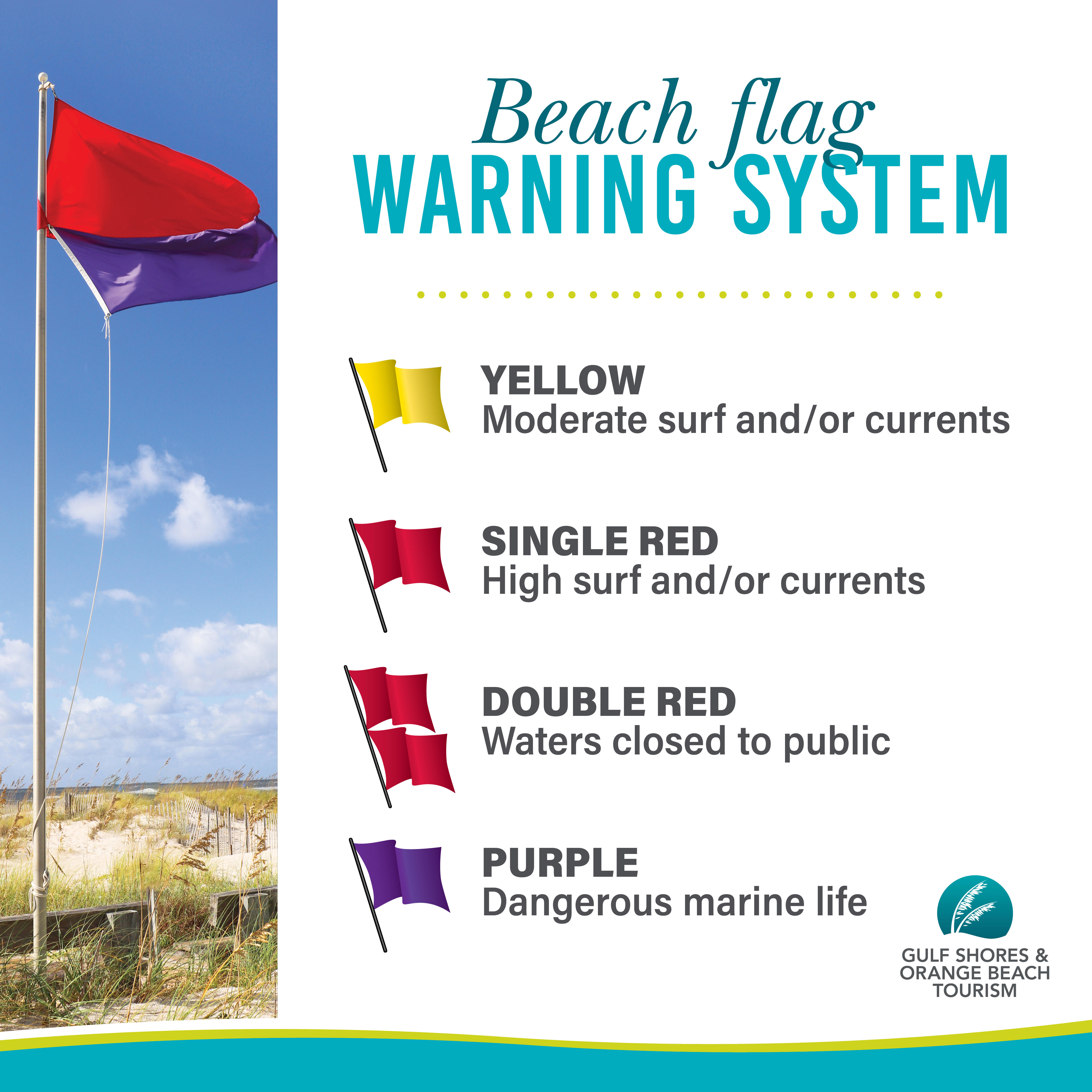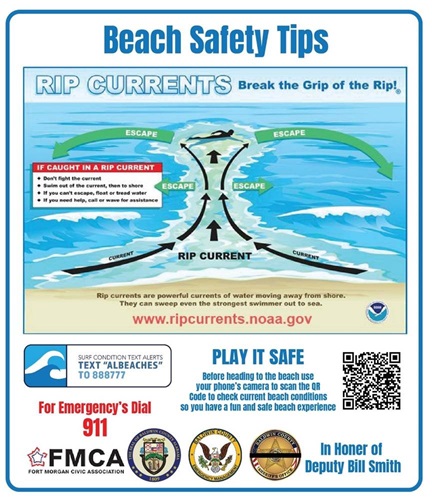
EMA Home
Alert Baldwin
Weather Information
Evacuation Information
Shelters
Prepare & Plan
Flood Management
Hazard Mitigation
LEPC
VOAD
Beach Safe
EMA Training & Events
Local Resources
State Resources
Federal Resources
Emergency Operations Plan
COVID-19 Resource Hub
Videos
Weather Stem
Contact Us
View Our Monthly Newsletter & Subscribe!
SIGN UP FOR DAILY BEACH CONDITIONS
Sign up to receive daily beach conditions and warning flag status by texting ALBEACHES to 888777. For additional weather alerts and warnings for the local area text ALERTBALDWIN to 888777. You can easily opt out from text alerts by texting STOP.
CHECK BEACH CONDITIONS
For beach conditions in Gulf Shores, call 251-968-SURF (7873).
For beach conditions in Orange Beach, call 251-981-SURF (7873).
For beach conditions across the entire Alabama coast, visit the National Weather Service, then select the Rip Current tab.
BEACH FLAG WARNING SYSTEM

BEWARE OF RIP CURRENTS
Rip currents are strong currents of water that quickly flow away from shore at surf beaches. They typically form at breaks in sandbars and near structures such as jetties and piers.
How to identify rip currents
- Rip currents are most prevalent when the waves crash perpendicular to the beach rather than at an angle.
- One of the easiest ways to spot a rip current is to look for gaps between the waves. A small patch of calm water surrounded by waves is often a rip current.
- Look for discolored water near the shore. Rip currents tend to drag large amounts of sand and sediment back out to sea with them, so many rip currents are easily identified by a noticeable flow of sand extending away from the shore.
- Rip currents are also common in areas near sand bars, piers, pilings and jetties.
How to escape a rip current
- Remain calm. Fighting the rip current can exhaust you.
- Escape the current by swimming parallel to the shoreline. When free of the current, swim at an angle—away from the current—toward shore.
- If unable to escape by swimming, float, or tread water. When the current weakens, swim at an angle away from the current toward the shore.
- If at any time you feel you will be unable to reach shore, draw attention to yourself: face the shore, call, or wave for help. To help someone else caught in a rip current, seek help from a lifeguard. If a lifeguard is not present, yell instructions on how to escape or throw the victim something that floats. Call 911 for further assistance.

BE A SAFE SWIMMER
Swimming in the Gulf is much different than swimming in a pool. It is important to respect the strength of the sea and the marine life that lives there.
- ALWAYS check surf and weather conditions before heading to the beach and observe beach flags.
- Never swim alone. Always stay in groups. Don’t wander too far from shore.
- Don’t swim near piers, pilings, and platforms. Exercise caution when swimming in areas between sandbars or near steep drop-offs.
- Do not swim in areas being used by fishermen. Avoid swimming in areas where schools of fish are present. Diving seabirds are good indicators of areas to avoid.
- Alcohol and swimming do not mix.
- Use extra caution when water is murky. Avoid being in the water during dusk, nighttime, or twilight hours.
- Avoid wearing shiny jewelry and clothing.
- Stay informed of local weather and beach conditions.
KNOW YOUR LOCATION
You may not always know the address of your location or how to instruct others to find you. With the What3words app, your location can be pinpointed within a 10-foot square. The entire world has been given a unique combination of three words for each 10-foot squire: a what3words address. Now you can find, share and navigate to precise location using three simple words. And while there are many ways to use the app, some of the best uses within our destination include:
- Helping emergency services find you
- Finding your way back to your parking space
- Helping others find you at a festival or Events
- For trail navigation
Learn more and download the app at what3words.com
PRACTICE SUN SAFETY
Protect Your Skin
Always wear a sunscreen appropriate for your skin type, paying special attention to face, nose, ears, shoulders, and feet. Protect your lips as well. Most people don’t realize how much sun they’re getting until it’s too late. Sunscreen should be applied at least 30 minutes prior to sun exposure and should be reapplied every two hours or after getting wet.Children Need Extra Protection
Liberally apply sunscreen 30 minutes prior to sun exposure. Make sure children wear sun hats and sunglasses. Re-apply sunscreen frequently, especially after swimming.Drink Plenty of Water
Even if you don’t feel thirsty, your body needs water to keep cool. Avoid drinks with alcohol or caffeine, which can dehydrate you.Protect Your Eyes
Ultra-violet (UV) rays can damage your eyes. Don’t forget your sunglasses.Beware of Heat Stroke
Watch for hot, red, and dry skin; changes in consciousness; rapid, weak pulse; and rapid, shallow breathing. If someone shows symptoms, call 911. Keep the victim lying down and cool the body by placing ice packs or cold packs on wrists, ankles, armpits, and neck. Wet towels may also be used.Jellyfish Sting Relief
Use saltwater to wash the sting. Apply rubbing alcohol or vinegar to the sting area. Do not rub the sting area. If the victim has trouble breathing or swallowing, seek immediate medical attention.Sunburn Relief
Drink lots of water. Soak in a cool bath or apply cold compresses several times a day. Acetaminophen or Ibuprofen may help relieve pain and swelling, and aloe vera may help relieve the burn. Do not apply petroleum jelly or oil-based lotions.
.png?sfvrsn=9bbc2119_1)
